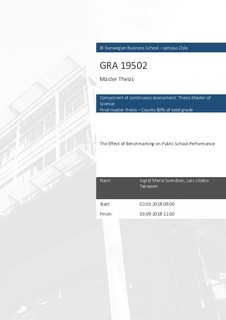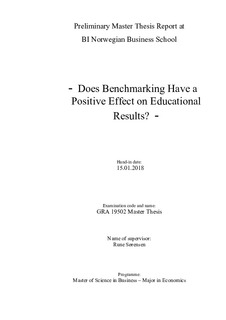| dc.contributor.author | Svendsen, Ingrid Marie | |
| dc.contributor.author | Tøraasen, Lars Lillebo | |
| dc.date.accessioned | 2019-01-02T13:11:03Z | |
| dc.date.available | 2019-01-02T13:11:03Z | |
| dc.date.issued | 2018 | |
| dc.identifier.uri | http://hdl.handle.net/11250/2578793 | |
| dc.description | Masteroppgave(MSc) in Master of Science in Business, Economics - Handelshøyskolen BI, 2018 | nb_NO |
| dc.description.abstract | Theory on public policy processes together with a range of private sector evidence
suggest that implementing benchmarking improves efficiency, and thereby may
work to improve public policy outcomes. A similar prediction is further confirmed
by basic economic theory on competition exposure.
The present thesis provides an empirical analysis of this relation by studying the
relationship between the implementation of benchmarking and educational
performance in primary- and lower secondary education in Norwegian local
governments.
The Norwegian educational sector has been subject to increased stress on
performance and results. The introduction of national tests adds to this in terms of
providing educational authorities, principals and local councils with information
on the average achievements in 5th and 8th grade of compulsory schooling.
However, our main results suggest that using these achievement-based scores to
benchmark one’s own school(s) does not work to improve educational
performance. | nb_NO |
| dc.language.iso | eng | nb_NO |
| dc.publisher | Handelshøyskolen BI | nb_NO |
| dc.subject | samfunnsøkonomi | nb_NO |
| dc.subject | economics | nb_NO |
| dc.title | The Effect of Benchmarking on Public School Performance | nb_NO |
| dc.type | Master thesis | nb_NO |

